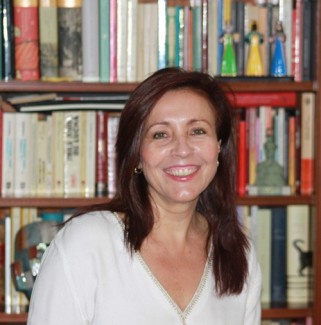Consuelo
Naranjo Orovio

Redes sociales
Academic Career
She holds a PhD in Geography and History from the Complutense University of Madrid and serves as a Research Professor at the Institute of History of the Spanish National Research Council (CSIC). She was Director of the aforementioned institute (2011–2019) and of the Center for Humanities and Social Sciences at the CSIC (2012–2013; 2018–2019). She is currently Editor-in-Chief of Culture & History Digital Journal, and has previously served as Director of Revista de Indias as well as a member of the editorial boards and advisory councils of several specialized journals.
At the Institute of History, she leads the Comparative Studies Group on the Caribbean and the Atlantic World, where she conducts research on the history of the Americas from a transatlantic perspective. This approach enables her to examine the circulation of knowledge, people, and economic and social models between Europe, Africa, and the Americas.
She has conducted research stays and taught courses and seminars at numerous institutions, including universities in the United States (Gainesville, Maryland, Saint Louis, Champaign, and Florida International University); El Colegio de México; Universidad Michoacana de San Nicolás de Hidalgo; UNAM; the University of Havana and the Cuban Institute of History; as well as various universities in Puerto Rico, the Dominican Republic, Chile, Brazil, Costa Rica, and Colombia, among others.
Impact on Academic Training:
• She has supervised 20 doctoral dissertations presented at various Spanish and Latin American universities (with 8 in progress), along with 9 master’s theses. She has also mentored international researchers, promoting excellence in human capital development with significant international impact on employment and knowledge transfer.
• She generously shares her academic experience with her students. Beyond academic guidance, she has supported their professional development at every stage, assisting them in preparing articles, monographs, and research proposals.
• Her teaching contributions include lectures and courses at prestigious universities and graduate programs internationally, including Harvard University and several institutions across Latin America, Europe, and the United States.
Honors and Notable Memberships:
• Member of distinguished academies such as the Cuban Academy of History, the Mexican Academy of Sciences, the Dominican Academy of History, AcademiaNet, and the Mexican Society of Geography and Statistics.
• Honored by the Embassy of Haiti at the Casa de América for her work in the study and dissemination of Haitian history.
• International Committees: Scientific Advisory Council of the Center for Advanced Latin American Studies (CALAS), German Federal Ministry of Education and Research (2025–); Advisory Board of the National Commission for the Commemorations of New Spain (Spanish Ministry of Foreign Affairs), 2013–2016; Academic Council of the Center for Advanced Studies, University of Costa Rica; Board of Trustees of the General Archive of the Indies.
• Reviewer for institutions such as CONICYT, the Portuguese Foundation for Science and Technology, ANEP, the European Science Foundation Pool of Reviewers, the Swiss National Science Foundation, among others.
• Director of the Antilia book series at Ediciones Doce Calles.
• Editorial board and review roles in works including: Cuba: An Illustrated Encyclopedia (2003); Biblioteca América collections (2006–2010); Tierra Nueva e Cielo Nuevo (1998–2006); Afro-Asia (from 2021); Caribbean Conjunctures (from 2020); Revista de Indias (1988–2022); Cuban Studies (2013–2018); Op. Cit. (1999); Mélanges de la Casa de Velázquez (from 2008); Anuario de Estudios Americanos (from 1997); Historia (from 2005); Nouveau Monde–Mondes Nouveaux (from 2001); and Jahrbuch für Geschichte Lateinamerikas (from 2020).
• Full Member of FLACSO-Spain since 2014.
• Recipient of the Research Award from Casa de Colón, Las Palmas de Gran Canaria (1993).
• Awarded the Extraordinary Graduation Prize by the Complutense University (1981).
Some key contributions:
Cuba, otro escenario de lucha. La Guerra Civil y el exilio republicano español (1988); Medicina y Racismo en Cuba, siglo XX (1996); El rumor de Haití en Cuba: temor, raza y rebeldía, 1789-1844 (2004); Las Antillas hispanas y las Antillas británicas. Dos modelos de colonización en el Caribe (2014); Fernando Ortiz. Estudio crítico (2016); Cartas con historia: Pedro Henríquez Ureña entre América y España (2021), Ramón de la Sagra. Un naturalista en Cuba (2024), y la dirección de obras fundamentales como La Nación soñada: Cuba, Puerto Rico y Filipinas ante el 98 (1996); Los lazos de la cultura. El Centro de Estudios Históricos de Madrid y la Universidad de Puerto Rico, 1916-1939 (2002); colección Historia de las Antillas (5 vols., 2009-2014); Más allá del azúcar: política, diversificación y prácticas económicas en Cuba, 1878-1930 (2009); Esclavitud y diferencia racial en el Caribe hispano (2017); Slavery and the African cultural legacy in the Caribbean (2020); Los márgenes de la esclavitud: resistencia, control y abolición en el Caribe y América Latina (2021); Sometidos a esclavitud. Los africanos y sus descendientes en el Caribe hispano (2021); Color, raza y racialización en América y el Caribe (2022), Historias conectadas del Caribe, África, Europa y las Américas. Esclavitud, racialización, resistencias y diversidad cultural, Buenos Aires, editorial Teseo, 2025, among others.
She has led two major European-funded projects:
Connected Worlds: The Caribbean, Origin of the Modern World (ConnecCaribbean) which brings together 15 institutions and 104 researchers from Europe, Latin America and the Caribbean (2019-2024). https://digital.csic.es/cris/project/pj00260
She currently directs the MSCA Transatlantic crossroads Lab (TransatlanticLab) project brings together 24 institutions from Europe, the Caribbean, Latin America and Africa, and 140 researchers (2026-2029).
Previously, she has been the principal investigator of 17 funded research projects.
In 2025, she launched the History of the Greater Caribbean Collection, approved by the Larramendi Foundation, encompassing 29 volumes and contributions from specialists at universities across Spain, Europe, and the Americas in fields such as history, literature, music, economics, and environmental studies.
In 2009, she initiated the first History of the Antilles written in Spanish, bringing together 78 scholars from 39 institutions across the Americas and Europe—including Spanish, Cuban, Puerto Rican, Mexican, Haitian, Dominican, U.S., British, German, French, and Danish academics—from diverse generations and historiographical traditions. This monumental five-volume work, published between 2009 and 2014, has marked a milestone in Caribbean studies and remains a lasting legacy for future research.
Research dissemination has prioritized Open Access, collaborating with publishers and organizing talks in schools and public seminars (at institutions such as Casa de América, the Instituto Cervantes, and the Museo de América), as well as through the ConnecCaribbean YouTube channel.
She also served as Director of the exhibition Slavery and the Cultural Legacy of Africa in the Caribbean, https://youtu.be/nQEOOudAqHs, which included two bilingual (Spanish-English) catalogues http://hdl.handle.net/10261/239675, bilingual documentaries https://www.youtube.com/watch?v=ZKf-jY-RBy0, https://youtu.be/d_thwXD4H44, https://youtu.be/uqtfv-ApXW0, and a story that has been adapted for the stage in various countries: Mamá mandinga. Entre África y el Caribe: http://hdl.handle.net/10261/275590
Datos tomados de la base de datos ConCiencia


